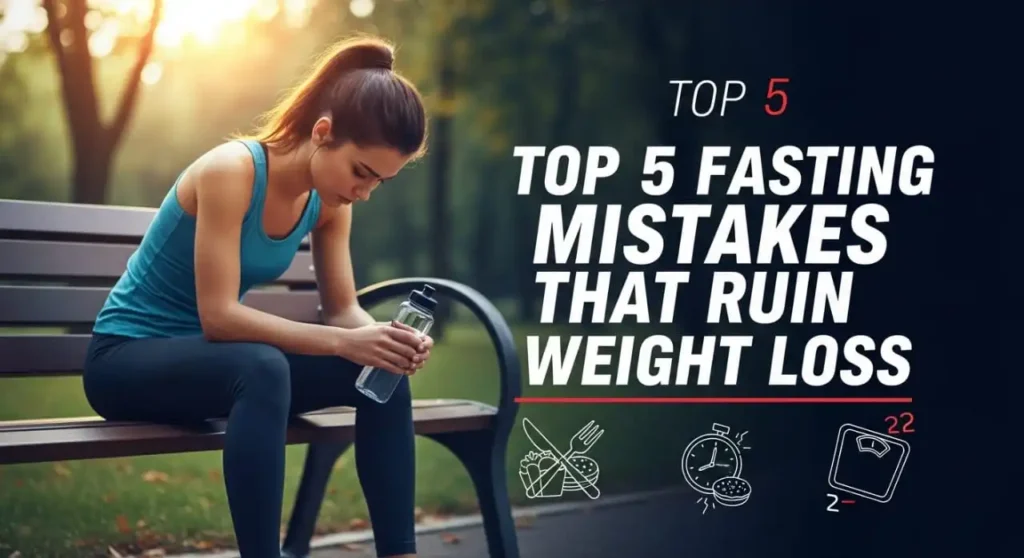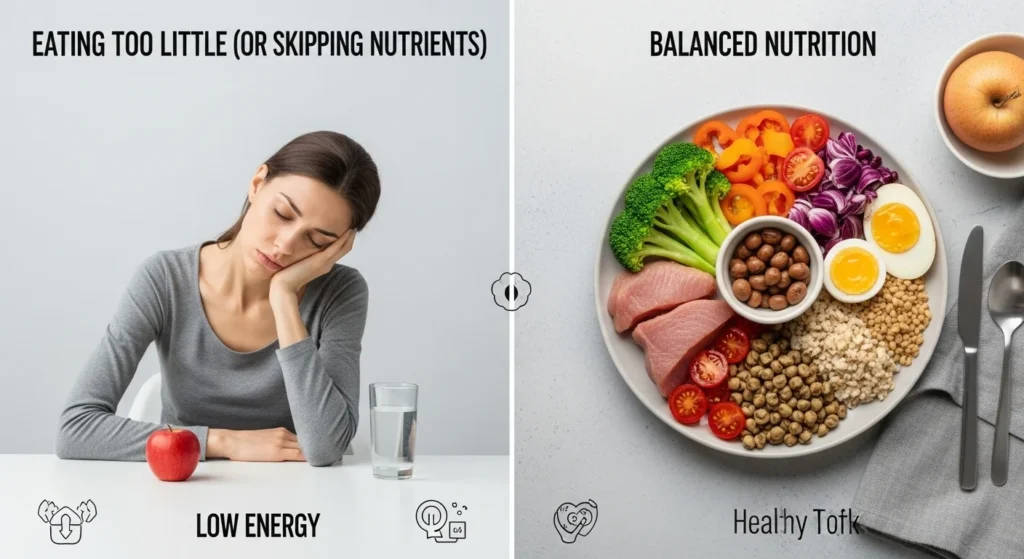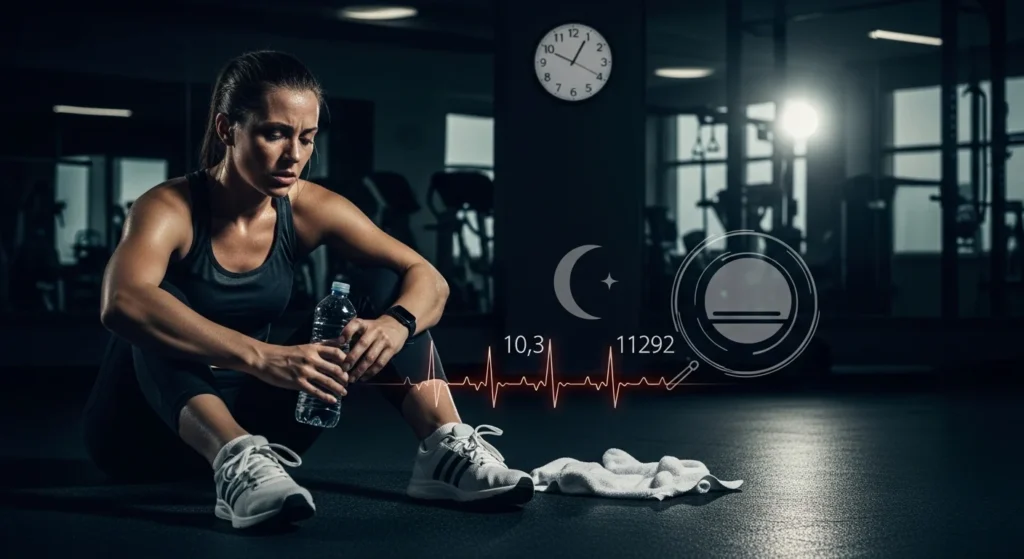If you are over 45 and you are doing intermittent fasting but not losing weight, you may be making some common fasting mistakes. The strategies that worked in your 20s or 30s may not be as effective after 45. Why? Because with aging, the body’s metabolism, hormones, and energy levels change.
In this article, we will discuss 5 major fasting mistakes people make at age 45+ — and provide science-backed solutions. These are not just quick tips, but a complete guide to smartly modify fasting according to your age. So if you want real results from fasting without feeling weak, stuck, or frustrated – this article is for you.
Why Fasting After 45 Is Different – Hormonal Shifts and Metabolism
When you were in your 20s or 30s, fasting seemed quite effective – but after 45 the body’s response changes significantly. Hormonal changes, metabolism slow down, and muscle loss directly impact your fasting results.
Muscle Mass Decline
After 45, the sarcopenia process starts in our body which is responsible for losing muscle mass naturally. Due to this, approximately 0.8% to 1% of muscle mass can be reduced every year, especially if you do not do strength training. Muscle is important not only for physical strength but also for burning fat. The more muscle you have, the more calories you burn even when you are resting the less muscle you have, the slower your metabolism will be, making both fat loss and fasting difficult.
Solution: You should add resistance exercises or strength training to your daily routine. The first meal after fasting should be high-protein. Include adequate protein in your meal like eggs, paneer, chicken, tofu, etc.
Insulin Sensitivity Changes
After the age of 45, our body’s insulin response gradually weakens. This means that when we eat carbohydrate-rich foods, the body becomes less efficient at transporting glucose to the cells. As a result, blood sugar levels rise, leading to energy dips and weight gain. Poor insulin sensitivity makes fat loss difficult because the body starts storing energy as fat instead of using it.
Solution: Fasting naturally improves insulin sensitivity but it is also important to eat low glycemic index foods (like oats, dalia, vegetables).
- Stay away from processed sugar and white carbs.
- Apple cider vinegar or lemon water can be helpful during fasting (but without calories).
- Daily physical activity, especially walking after meals, helps improve insulin sensitivity.
Top 5 Fasting Mistakes That Ruin Weight Loss

Mistake 1: Not Adjusting Your Eating Window to Your Age
Many people follow popular fasting patterns they see on the internet, such as 16:8 or OMAD (One Meal a Day), especially those over the age of 45. However, as we age, the body undergoes several changes—such as a slower metabolism, hormonal shifts, and decreased energy levels. The way your body responds to fasting at age 28 or 33 is not the same as it does now. If you continue to follow the same strict fasting window without paying attention to your body’s signals, it can stall your weight loss—or even cause weight gain.
Fix: Find Your Circadian Rhythm
If you go to sleep early at night and wake up early in the morning, shift your eating window to the morning – like 8 AM to 6 PM. This matches your circadian rhythm, which improves digestion, keeps energy stable, and makes weight loss more effective.
It is important to keep in mind that for older adults, eating late at night can have a negative effect on metabolism. Therefore, it is best to finish dinner before 7 pm. Do not follow your fasting schedule blindly. Adjust smartly according to your age, routine, and body signals.
Mistake 2: Eating Too Little (Or Skipping Nutrients)

Many people who fast, just eat one or two small meals thinking that eating less will burn more fat. But after 45, if you do not give your body the necessary nutrients, metabolism slows down and weight loss stops.
Undereating = Slow metabolism + Weak energy + Muscle loss
With aging, our hormones are already fluctuating. If you do not take proper nutrition, not only does fat loss become difficult, but you also feel tired, have mood swings and immunity decreases.
Fix: Focus on Nutrient-Dense Meals
Now when you break your fast, every bite should be meaningful. That is, have meals that may be small but are full of nutrition:
- Protein: Chicken, paneer, tofu, dal — these support your muscles and keep you full.
- Healthy fats: like nuts, seeds, ghee, olive oil — these are essential for your hormones.
- Fiber: Vegetables, fruits, whole grains — improve digestion and keep sugar spikes under control.
Mistake 3: Over-Exercising While Fasting

Many people think that exercising more while fasting will burn fat faster. But after 45, this approach can be harmful to your body. When you are fasting and do high-intensity workouts, your cortisol level (stress hormone) increases.
High cortisol = Muscle loss + Fat gain + Energy crash
With aging, our body’s recovery power slows down. When you over-exercise in a fasting state, the body can break down muscles and fat burning stops instead.
Fix: Align Movement With Energy Levels
Smart exercise is most important when fasting. Focus on low-impact and muscle-preserving workouts. Here are some safe options:
- Walking or light jogging – especially during the morning fasting window
- Yoga or stretching – to relax the body and improve flexibility
- Strength training (post-fast) – As soon as you break the fast, strength training after a protein-rich meal is best for maintaining muscle
Mistake 4: Ignoring Sleep and Stress Management

Many people focus on the physical aspects of fasting — like eating window, calorie intake, or workout — but ignore sleep and stress management. If you’re over 45, these two things can be game-changers for your weight loss.
Lack of sleep = Hormone Imbalance
When you do not get proper 7–8 hours of sleep, your body’s hormones like cortisol (stress hormone) and ghrelin (hunger hormone) become imbalanced. This leads to:
- Cravings increase (especially for sugary foods)
- Fat storage increases, especially the around belly
- Energy levels remain low, which makes fasting more difficult.
Your metabolism also slows down due to poor sleep, which has a direct impact on your weight loss results.
Stress = Silent Weight Gain Trigger
Your cortisol level remains constantly high due to chronic stress. These hormones:
- Store fat, especially in the abdominal area
- Break down muscle (which is important for metabolism)
- Makes fasting difficult mentally and physically
Fasting itself is a mild stress. If you already have a lot of emotional or work-related stress in your life, fasting can have the opposite result – weight gain instead of loss.
Fix: Prioritize Recovery and Rest
No matter how well you fast and exercise, full results will not be possible without rest and recovery. Here’s what you should do:
- Sleep at least 7–8 hours every night. Try to sleep and wake up at the same time daily.
- Avoid blue light (mobile/laptop) 1 hour before sleeping.
- Practice relaxation techniques like meditation, deep breathing, journaling, or evening walk.
- Reduce caffeine intake after 3 PM so that it does not affect sleep.
Try to make your fasting routine stress-free — overthinking and guilt make fasting even more stressful.
Mistake 5: Using Fasting as a Quick Fix, Not a Lifestyle

Many people see intermittent fasting as just a quick weight-loss trick. They think – “I will fast for 2 weeks, the weight will go away, then everything will be normal.” But this mindset is the biggest problem, especially after age 45.
Fasting isn’t a magic button. If you treat it like a crash diet, you may get short-term results – but in the long term the weight will come back, and both the body and metabolism will get confused.
Your body needs consistency and stability, not shocks. Over 45, hormones and metabolism are already slowing down. In such a situation, extreme fasting or inconsistent eating habits make fat loss even more difficult.
Fix: Turn Fasting into a Lifestyle, Not a Phase
Don’t look at fasting as a short-term challenge — use it as a long-term health strategy. Start with small and realistic steps, like a 12:12 or 14:10 fasting window. Give your body time to adjust. No need to jump into intense fasting routines like OMAD right away.
Start with easy tweaks:
- Start delaying breakfast a bit
- Get into the habit of finishing dinner early
- Focus on clean, whole foods during the eating window
The most important thing? Listen to your body. If you’re feeling low on energy or feeling particularly weak, it’s perfectly fine to tweak your fasting pattern. It’s not about being strict — it’s about being in tune with your needs.
Fasting will only work when you incorporate it into your daily routine naturally, not forcefully. When fasting starts to feel comfortable and sustainable, only then will its true benefits be seen — along with weight loss, and overall better health.
Additional Tips to Enhance Fasting Results After 45
You are fasting after 45? That’s amazing — but let’s be real, the body responds a little differently at this age. These are some simple, real-life tips that I have noticed personally or through clients. Trust me, these small things can make a huge difference in fasting results.
Did you drink water? But minerals are also important.
Look, just drinking water during fasting is not enough. Often people complain that they feel dizzy or low in energy during fasting — and the reason for this is electrolyte imbalance.
- Take a pinch of Himalayan salt with dal lemon water in the morning.
- Or use sugar-free electrolyte powder (which athletes use).
- Coconut water (no added sugar) also helps a lot if you are fasting for a long time. Taking minerals along with water during fasting is a game changer.
Conclusion
Fasting after 45 isn’t about doing more or pushing harder — it’s about getting smarter.
Your body is different now. Hormones shift, metabolism slows, and energy recovery takes longer than it did in your 20s or 30s. But that doesn’t mean weight loss or vibrant health is out of reach. In fact, with the right approach, fasting can be one of the most powerful tools for your health in your 40s, 50s, and beyond.

